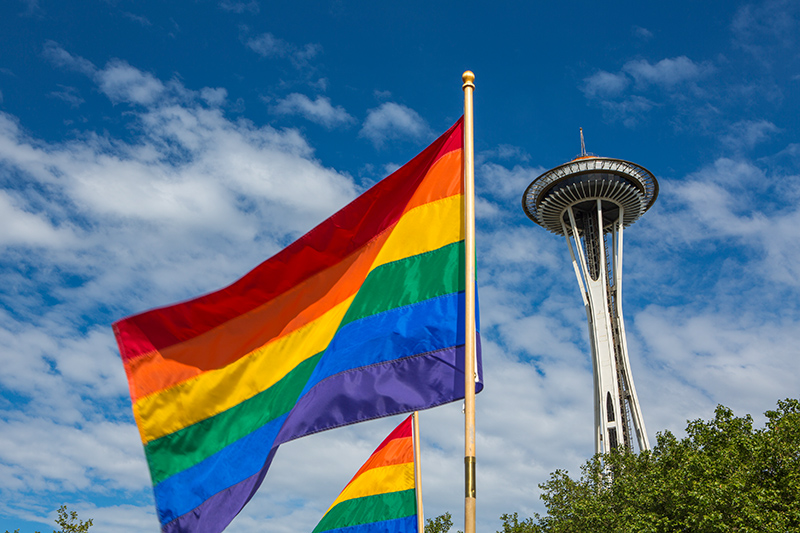U.S.-Mexico Soccer Match Suspended Over Anti-Gay Chant
Referees ended CONCACAF league semifinal match early because Mexican fans repeatedly chanted anti-gay slur at U.S. players.

Officials ended the CONCACAF Nations League semifinal soccer match between Mexico and the United States early on Thursday, cutting off play in the final minutes due to Mexican fans chanting an anti-gay slur at U.S. players.
Referees first paused the game around minute 89 of the 90-minute match to ask fans to stop chanting the slur — slang for a male sex worker — which has been employed by many soccer fans from Spanish-speaking countries to belittle opposing players for allegedly being insufficiently masculine.
Such chants are often employed in the hope of triggering or distracting opposing players — in this particular instance, the U.S. team’s goalkeeper, Matt Turner.
Following soccer officials’ request to stop the chanting, twelve minutes of stoppage time — time lost throughout the course of a 90-minute game, such as when play is halted to treat players for injuries or review scoring or penalty plays, which is later added onto the clock near the end of a match — were added to the clock. But within eight minutes, the Mexican fans resumed the chant. The referee, using his discretion, then ended the game early in response.
During the contentious game, played at Allegiant Stadium in Las Vegas, four players — 2 from each team — were issued “red cards” and ejected from the match, causing tensions among players and fans alike to rise, according to Fox News Sports.
“In terms of the chant, I want to make it very clear first and foremost, for our beliefs and our culture, it has no place in the game,” B.J. Callaghan, the interim head coach of the U.S. team, said. “It has no place in our value system.”
“[The anti-gay chant] goes against everything that we stand for, on our side,” goalkeeper Matt Turner told Kevin Baxter, a reporter for the Los Angeles Times.
“We’ve been very open and vocal about you know, the strength of our team being our diversity… the strength of our nation being its diversity. So, to use something so divisive during a game, a spirited game…it has no place in the game,” said Turner.
CONCACAF — the Confederation of North, Central America and Caribbean Association Football –- which is one of FIFA’s governing bodies for international soccer, told ESPN that the decision to end the game was at the “referee’s discretion” and not because of confederation protocols.
They later released a more forceful statement.
“CONCACAF strongly condemns the discriminatory chanting by some fans during the CNL Semifinal match between Mexico and the United States,” the organization wrote.
“Chants heard during the game led to the activation of the anti-discrimination protocol by the match officials. Additionally, security staff ejected several fans for engaging in unacceptable behavior in the stadium,” CONCACAF continued. “These incidents were extremely disappointing and tarnished what should have been a positive occasion to showcase high-quality football in our region.
“The Confederation is in the process of urgently establishing further details and reports from security and match officials and will make a further statement in short order,” the organization added.
This specific anti-gay chant is often yelled by fans when the Mexican team is close to scoring, in hopes of distracting the other team’s goalkeeper. FIFA, the international head governing body for soccer, previously fined Mexico 100,000 Swiss francs, or approximately $111,000, for fan behavior in two separate games.
According to ESPN, the Mexican Football Federation (FMF) has struggled in vain to eradicate the practice, using public service announcements, social media posts, and pregame announcements from the players to discourage the use of the slur. Although the popularity of the chant has declined in recent years, it is still prevalent, and even popular, among many fans.
U.S. Soccer has also tried to curb homophobic slurs. Last May they instituted new policies, including policy 521-2, that expressly prohibit discriminatory chants “defined as any derogatory chant relative to race, ethnicity, religion, sexual orientation, and/or gender.”
Violations of the policy are supposed to be punished by banning the offending team from playing on U.S. soil for two years, for up to five years for a second violation, and permanently, for a third violation.
However, in April, the U.S. faced Mexico in a “friendly game,” or one that does not have an impact on a team’s standing in the league, in Arizona. During that game Mexican fans chanted anti-gay slurs, but the game was not paused or suspended, and U.S. Soccer, as the game’s promoter, failed to take action, which critics say highlights U.S. Soccer’s lack of sufficient commitment to stopping the practice.
Moving forward, Mexico could face a ban from U.S. soil, but “[If] Mexico makes a good-faith attempt to eradicate the chants, there wouldn’t be any sanctions. There’s also uncertainty about what threshold would need to be crossed for the ban to potentially go into effect,” an unnamed source told ESPN.
After the game, both Mexican and U.S. officials called the fans’ actions “embarrassing.”
With 3-0 on the board before the match was suspended, the U.S. is considered the winner of the match, and will face Canada in the finals on Sunday, June 18.
Support Metro Weekly’s Journalism
These are challenging times for news organizations. And yet it’s crucial we stay active and provide vital resources and information to both our local readers and the world. So won’t you please take a moment and consider supporting Metro Weekly with a membership? For as little as $5 a month, you can help ensure Metro Weekly magazine and MetroWeekly.com remain free, viable resources as we provide the best, most diverse, culturally-resonant LGBTQ coverage in both the D.C. region and around the world. Memberships come with exclusive perks and discounts, your own personal digital delivery of each week’s magazine (and an archive), access to our Member's Lounge when it launches this fall, and exclusive members-only items like Metro Weekly Membership Mugs and Tote Bags! Check out all our membership levels here and please join us today!





























You must be logged in to post a comment.